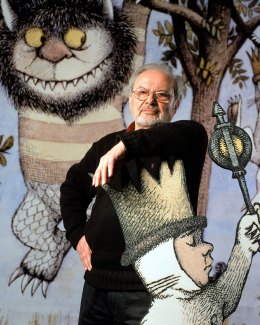
In 1962, Harper & Row published Maurice Sendak’s Nutshell Library, a tiny box set of four little books, two of which are minuscule masterpieces: the cautionary tale Pierre and Chicken Soup with Rice, a calendar poem the great and fiercely critical Marianne Moore told Maurice she wished she’d written. But Nutshell Library is more magical than the sum of its considerable parts. With its handsomely bound, dust-jacketed volumes neatly nestled in their eponymous nutshell of a slipcover, adorned top to bottom with Maurice’s often imitated yet inimitable drawings, it’s an exquisite object that even a child too small to be able to read can hold; that’s its true point, the source of its potent charm. It’s an object designed to be deliciously possessable, intended by its author to turn any child into a book lover, a book owner, a book fetishist. Maurice wanted to spread the gospel of one of his literary heroes, Herman Melville (the title of whose novel Pierre Maurice incorporated into his Library), who saw that a book can be “a planet on a table.” We hold books, and books can hold, or at least enfold, the world.
Maurice adored books and railed against their replacement by downloadable digital files. He lived to create books — there are more than 90 for which he supplied pictures and/or words — and now, having left the world, Maurice Sendak, a sublime artist and a splendid, delightful man, resides entirely, and probably immortally, within the books he created. He’s always worth a visit. Look for him there.
Kushner is a Pulitzer Prize–winning playwright and the screenwriter of Lincoln
